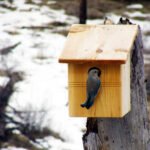
On Saturday and Sunday, birds near Bush Intercontinental Airport in Houston began falling from the sky and acting very strangely. Some were paralyzed on the ground with their beaks open while others flew around drunkenly before dying.
I can’t imagine how utterly horrific this scene must have been for those who saw it firsthand.
Here’s an excerpt from a local news story about the birds and the airport employees who saw them:
“It was going around and around in circles, you know, like how somebody is drunk or dizzy,” said parking lot worker Betrice Miles.
She was talking about pigeons and grackles exhibiting seizure-like behavior, and the beginning of a slow death. Miles’ co-worker Shara Kelly shot video of one dying bird on her cell phone.
“It was right there for a long time just flipping and flipping and flipping,” Kelly said. “And I was like, why are these birds dying like that, I don’t know if it’s something that somebody fed them.”
So what happened to these birds? They were in fact victims of poisoning by a pest control company hired by United Airlines and the Houston Airport System as part of the “bird abatement program” that aims to minimize bird strikes on planes.
Needless to say this is quite controversial in the eyes of animal rights groups (and pretty much anyone who has a heart).
There are countless ways to keep away unwanted birds, such as birds of prey, border collie patrol units, unpleasant noises, scarecrows and more. So why is it that people and places continue to use poison to get rid of troublesome birds?
Some reports say that they’ve been doing this once or twice a year for a while already, but this is such an obviously wrong thing to do that there’s no benefit in doing it. Even if they somehow don’t see anything wrong with killing birds, they have to know it would backfire from a PR standpoint.
A few months ago, JFK airport was vilified for shooting Snowy Owls on sight and quickly reversed its policy. They had to have seen that reaction.
Along with the morality aspect of poisoning birds, it could have a negative effect on the ecosystem if migratory birds were to consume the food (making what they’re doing illegal) or if other animals were to eat the dead birds.
Hopefully United Airlines and any other organizations still practicing these outdated modes of bird control will stop defending their actions and get with the times by using more humane ways to control bird populations around airports.
Watch the news report below:



Comments are closed.